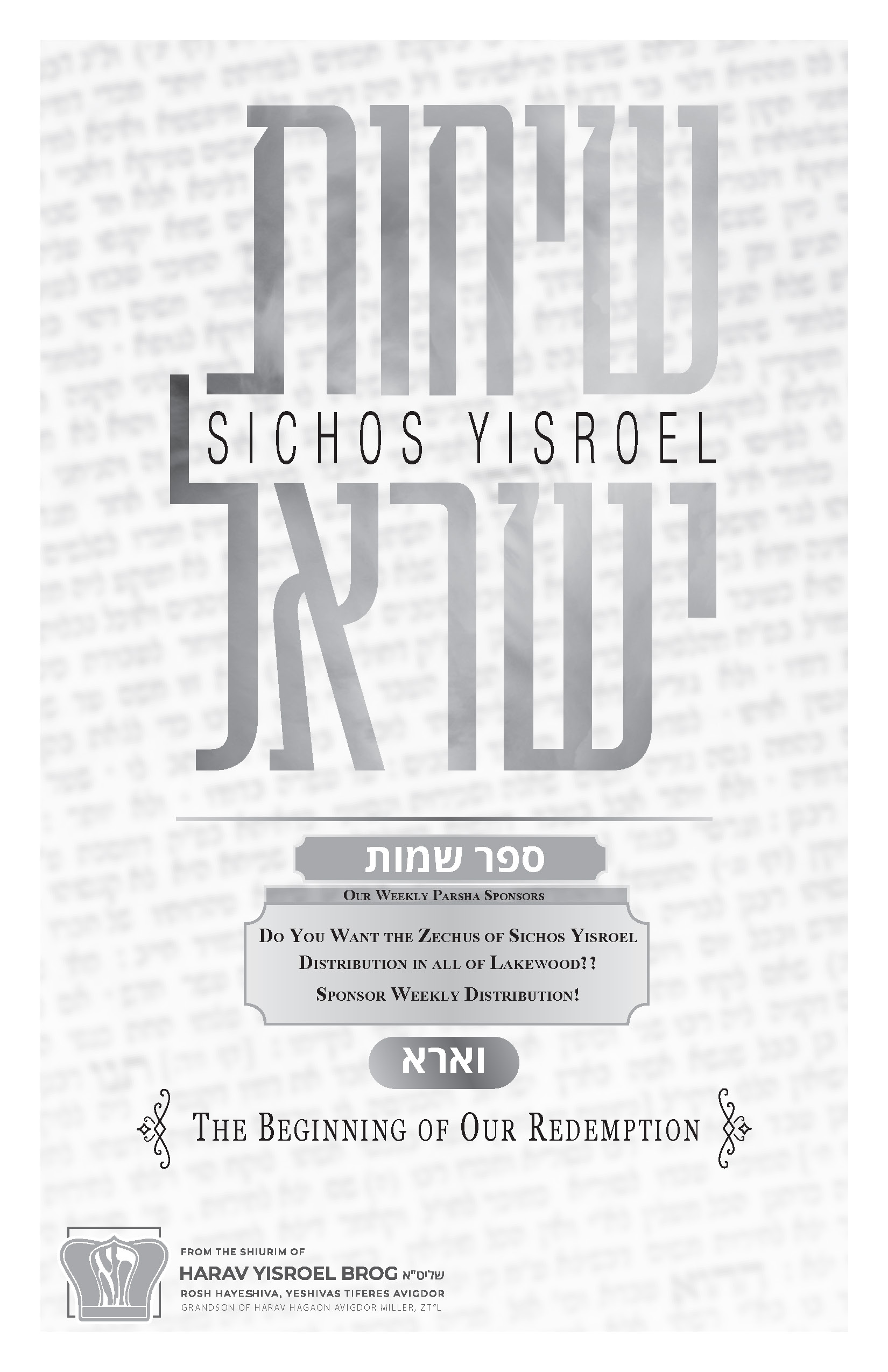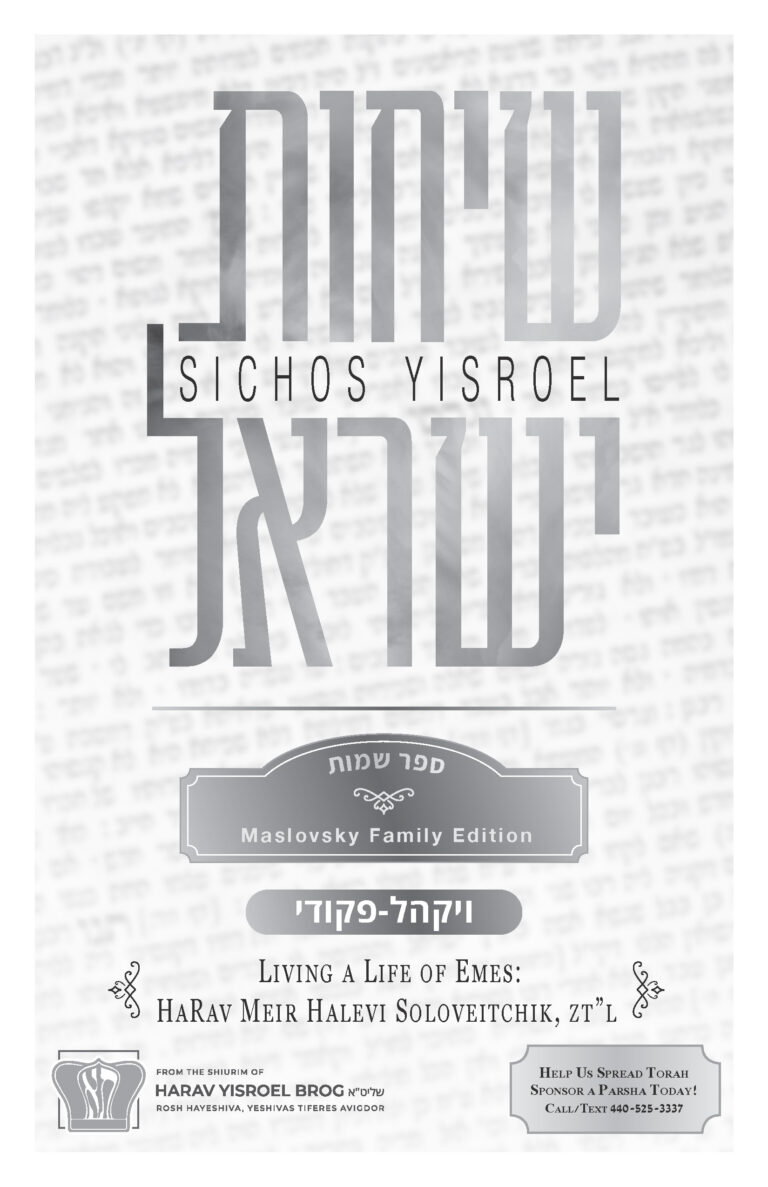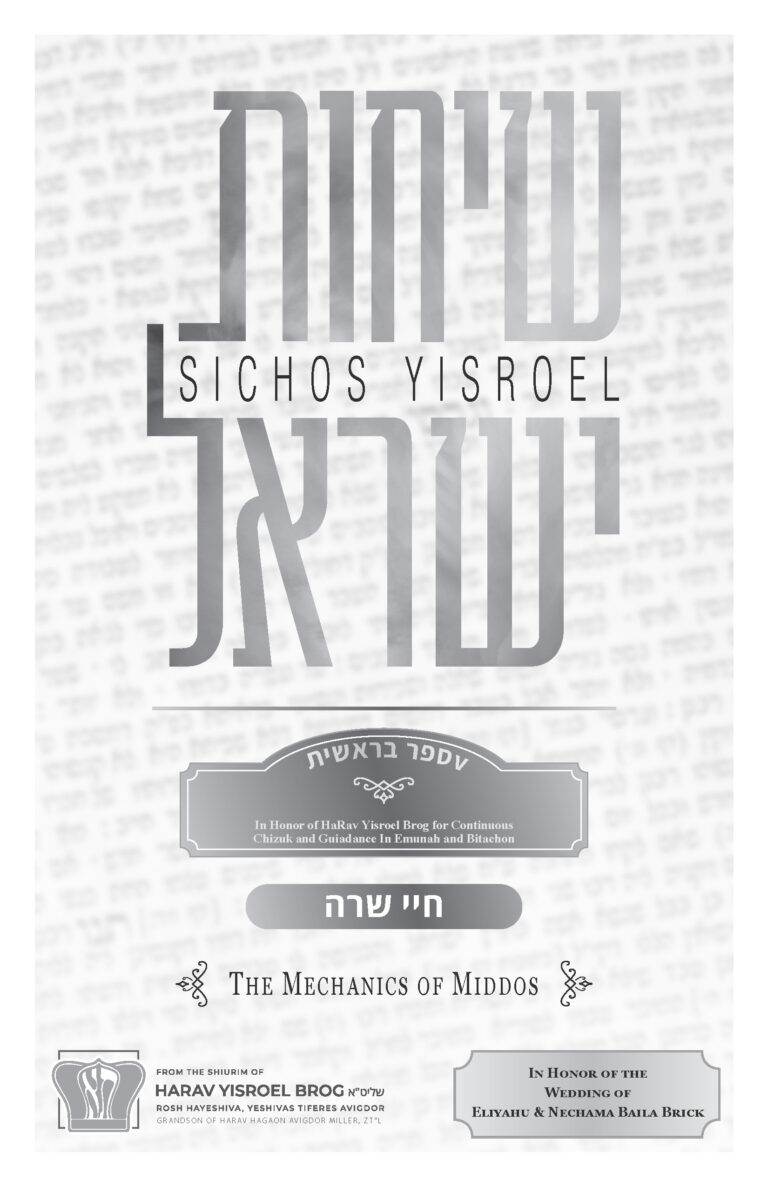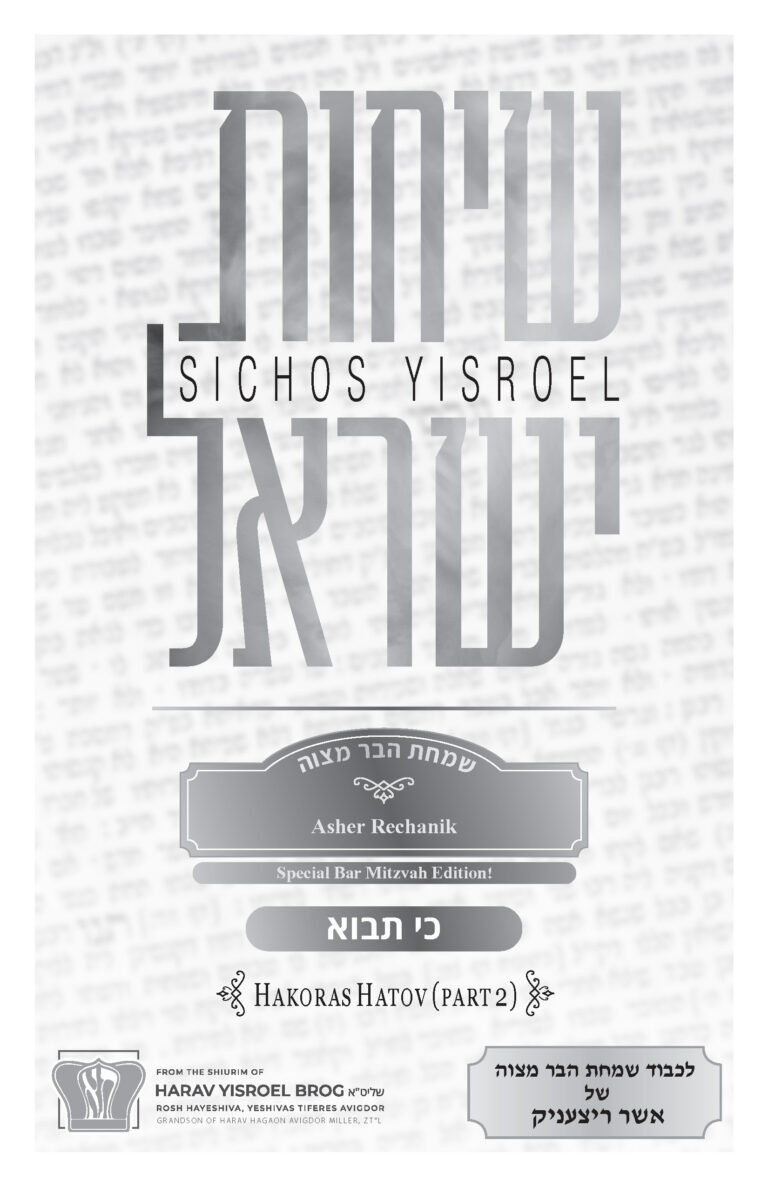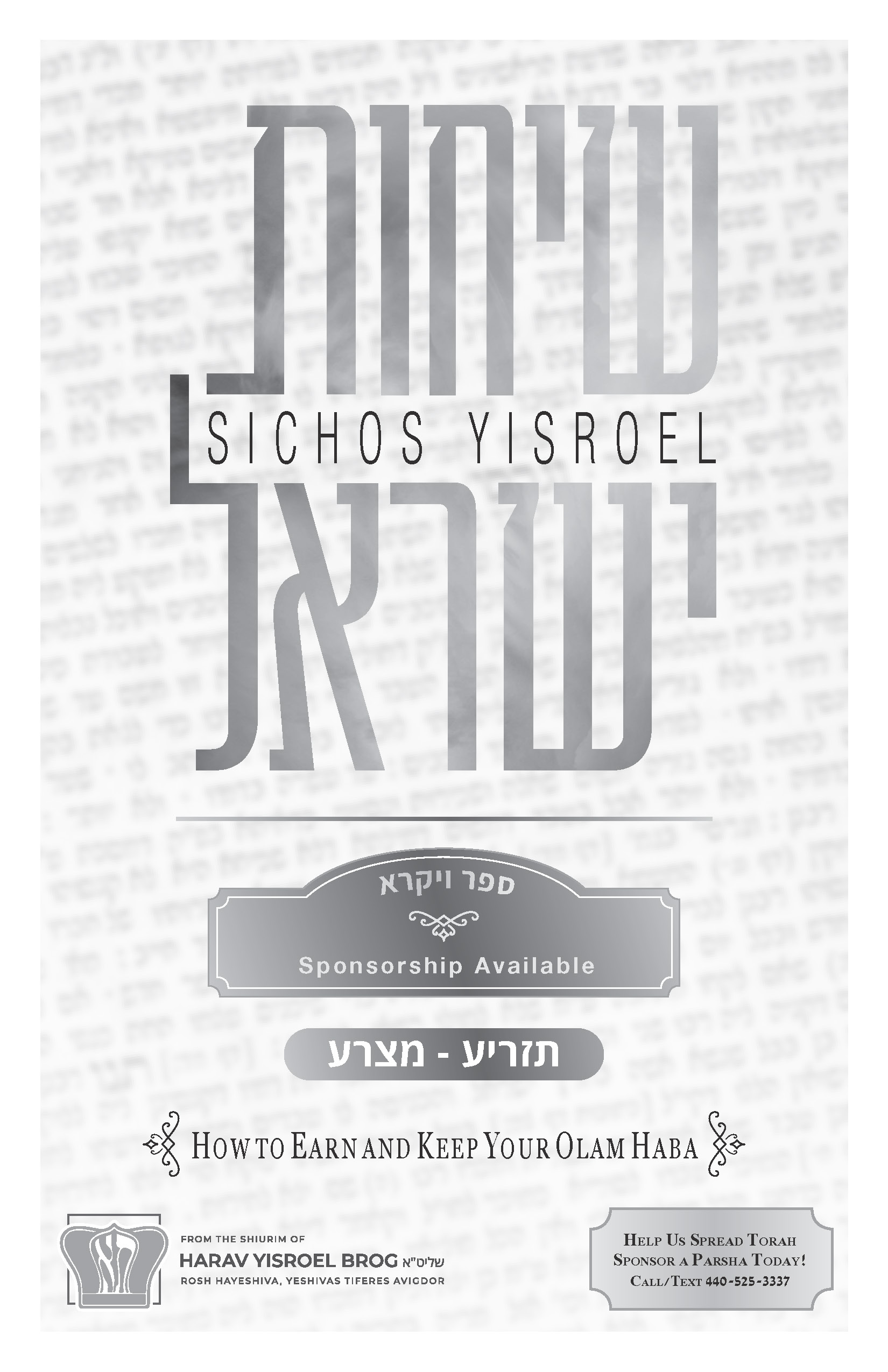Vaera 5785: The Beginning of Our Redemption
Sponsored
Do You Want the Zechus of Sichos Yisroel Distribution in all of Lakewood??
Sponsor Weekly Distribution!
Consider sponsoring a shiur
Visit YTATorah.org
Shiurim given in 5778
Parshas Va’eira: The Beginning of Our Redemption (5778)
Pharaoh, The Ga’avtan
In this week’s parshah, we encounter the yetzias Mitzrayim. Last week’s parshah was about the galus Mitzrayim. And this week’s parshah begins with Hakadosh Baruch Hu taking us out of Mitzrayim. The pasuk says: ויאמר ה’ אל משה ואל אהרון לאמר, Hashem said to Moshe and Aharon to tell over, כי ידבר אליכם פרעה, when Pharaoh will speak to you, לאמר תנו לכם מופת, saying that you should produce a miracle (Shemos 7:9). He will tell you to show him some miraculous proof that you are agents of Hashem and you are not just saying it on your own. ואמרת אל אהרון, say to Aharon, קח את מטך, take your staff, the one that Moshe Rabbeinu was holding – this was the staff that Hashem spoke about in last week’s parshah, that you’re going to perform miracles with – and now Moshe, transfer it over to Aharon and let him perform the miracles with it. והשלך לפני פרעה, throw it down before Pharaoh, ויהי לתנין, and this stick will turn into a serpent, a type of a snake (ibid, 7:10). Interesting, the choice of word that Hashem uses – tanin, a word that is also used to refer to sea serpent. Throw it before Pharaoh, and it will become a tanin. This was similar to the miracle that Moshe performed for the Jewish nation when he first came to see them but over there the staff became a nachash. Now it became a tanin. In front of Pharaoh it didn’t become a snake. It became a tanin.
Now, the passuk in Yechezkel (29:3) says that the Pharaoh identified himself as the tanin hagadol, the big sea serpent, and he said, “I am the sea serpent, the biggest of all the sea serpents of the Nile,” Pharaoh said. “The Nile River is mine. I made it and I created it.” They believed that the sea serpents in the Nile had godliness, and they worshiped them. Actually, their folklore was that the biggest sea serpent created it and the Yeohr, and it turned into Pharaoh. And now that’s why Pharaoh was called the tanin hagadol. And he glorified himself and said, “The Nile is mine. Everything is mine.” So Hashem turned the mateh into a tanin to show Pharoah teach him a lesson and show him who is who.
Stick Eats Stick
What happened? ויקרא גם פרעה לחכמים ולמכשפים, Pharaoh called his wise men and his machashafim, ויעשו גם הם, and the chartumei Mitzrayim also performed their magic and they turned their sticks into serpents (Shemos 7:11). וישליכו איש מטהו, each one of these people threw down their stick and it turned into serpents. ויבלע מטה אהרן את מטתם, and now the staff of Aharon swallowed all of their sticks (v. 12)
What does that mean? It means like this. Rashi explains they turned their sticks into serpents, and then they turned back into sticks. Then, the stick of Aharon swallowed all their sticks. Usually, a stick doesn’t swallow. Serpents swallow. Sticks don’t swallow. And here, the stick swallowed. And what happened was the mateh of Aharon, even though it swallowed up all the sticks, it did not become wider and thicker in spite of the fact that now it contained a whole bunch of these sticks. Rashi says, ויבלע מטה אהרן, after it turned back into a stick, that’s when it swallowed them all up.
The question is, what is the message over here? What does Hakadosh Baruch Hu want Moshe and Aharon to say to Pharaoh? And the answer is: “I want you to know that you and all of your gods are no more than a stick in My hand. That’s all you are.” Hashem wanted Pharaoh to know: “You think you represent the big serpent? Let me tell you something. You’re no serpent and you’re not big. All you are is a stick in My hand. That’s what you are. You’re a stick in My hand.”
The Pharaoh In Our Own Lives
Now, there is a tremendous lesson over here for us to learn. But before we tell you that lesson, I want to share with you a Chazal (Bereishis Rabbah 9:7).[i] The Medrash says as follows: אמר הקב”ה אם יבלע תנין את תניניהם של מצרים, if their snake eats up the Egyptian snakes, יאמרו מנהג של עולם הוא, they will say “That’s the custom of the world. The big snake eats little snakes.” So Hakadosh Baruch Hu said, “I’ll turn them all back into sticks and I’ll have the one stick go and swallow the others up.” When Pharaoh saw that, he said, “Oh my goodness. What’s going to be if the guy decides to tell his stick to eat Pharaoh and to eat my whole throne up? If he gives the word, ‘Go get him boy, stick it to him,’ then I will be a stick and that will become some shtick!” So Pharaoh got very nervous. But he still didn’t change his mind.
What Hakadosh Baruch Hu was showing Pharaoh was, “Big snakes are mere sticks to Me. You’re a big serpent? You consider yourself a big sea serpent? Let me tell you something. You’re nothing more than a stick in My hand.” That was the shalom aleichem Hashem told Pharaoh. That was the first lesson when Pharaoh said, “Identify to me that you were sent by Hashem.”
This is a tremendous lesson for us as well. I want to tell you why. In the world, there are natural things that frighten people. If you walk down the street and suddenly you hear a rattling. You look down and you see snakes slithering out of the woods. So, most people, even if it isn’t rattling and it was just a little garden snake or perhaps just a worm, would start to jump and scream and say, “This place is full of snakes.” That’s what people do. But you have to understand that if you meet real snakes it is worse. People are afraid of real snakes. Real snakes come in many forms. They come in animal forms and they come in Pharaoh forms. They come in human forms. There are bad people.
Imagine you would be walking down the street and you would encounter some Muslim-looking men talking in a foreign language that didn’t sound like Yiddish. One guy has his hand behind his back, and they have this glint in their eyes, and you’re not sure, “Should I cross paths with them?” But then you hear them say, “Allahu akbar, Allahu akbar” as they start walking quickly towards you, and you go into a ‘Ashar Yatzar’ mode very, very quickly. That’s how people are. People face things, and they’re trained from when they were little kids to be afraid of them. You see a couple of shady characters from the hood that look like they aren’t friendly. They don’t want to help you. You get nervous from them.
I remember when I was a bachur in Montreal, when I used to walk to the dorms, sometimes I would see these guys on the street. At first, I was intimidated by them, but then I walked by and they said, “Good evening.” They were all Jamaicans, a different breed of kushim. They werefriendly.
Everyone Is a ‘Stick’ in Hashem’s Hand
A person has to know that number one, they’re all sticks. There’s nothing to them. A person could growl, a person could bark, a person could threaten. You have to know it’s all a stick in Hashem’s hand; Hashem is controlling them. That’s what a person has to know. But now I’m going to tell you a bigger chiddush. When you face a dangerous situation, the nature of a person is that he thinks – if he’s a frumme Yid – “Okay, Hashem sent this person here to damage me. That’s how it is.” Some people think that their spouses are their enemies. Their wives are out to get them. Some people think their husbands are out to get them. Many people think friends or neighbors are out to get them. A person has to know that number one, everything is a stick in Hashem’s hand.
Now, does that make me feel any better? If I know it’s a stick in Hashem’s hand, does that change anything for me? Does that change anything for you? To most people, it doesn’t change anything. So if Hashem wants me to see these guys, the Allahu akbar guys, it means Hashem sent these guys to me. What’s the difference? Does it make a difference now that you know it’s really a stick from Hashem?
So let’s learn a piece of Rav Chaim Volozhiner (Nefesh Hachaim 3:12). It may be one of the biggest chiddushim you’ve heard over here. Rav Chaim Volozhiner says like this: ענין גדול, a big matter, וסגולה נפלאה, and an amazing treasure, להסיר, to remove, ולבטל מעליו, and to nullify from upon oneself כל דינים, any judgments, ורצונות אחרים, or the will of others, שלא יוכלו לשלוט בו, that they will not be able to have any rule and shlitah (control) over him, ולא יעשו שום רושם כלל, and they shouldn’t make any roshem (impression) whatsoever.[ii]
Rav Chaim Volozhiner’s Unique Strategy
You hear what he’s telling me? This is like free security! If we took a security company or we sat down with some former Israeli Shabak guy, who thought he was Mr. Security, it would cost a fortune. Shabak sells their lokshen to all the nations around the world, that they are the real security experts. Everybody believes in them, and then they make their money. Ken yirbu. But Rav Chaim Volozhin says: Let me put them out of business for you. I’m going to give you some security advice that prevents all judgments from coming upon you through another human being. The will of others is not able to have any control over you. They cannot even make a roshem on you. He says: When a person is קובע בליבו, a person sets in his heart – kovei’a means you have to be kovei’a this in your heart – לאמר, saying, “הלא ה’ הוא האלקים, Hashem is the Elokim.” You know what that means to say? Hashem is the master of all forces in the world, in the universe. Hashem is the controller of every single force in this world. And He is the אלקים אמיתי, He’s the only force, ואין עוד מלבדו יתברך, there’s nothing else besides Hakadosh Baruch Hu, שום כח בעולם, there is no other force in the world, ובכל העולמות, in all the worlds, כלל, whatsoever, והכל מלא, and everything is full of רק אחדותו הפשוט יתברך שמו, the only thing that fills the world is the oneness of Hashem and nothing else. But he has to be kovea this in his heart. He has to establish this thought in his heart, that אין עוד מלבדו, there’s no other force but Hakadosh Baruch Hu.
He says: ומבטל בלבו, he has to nullify in his heart, ביטול גמור, absolute bitul. We find there is a legalwayin the Torah to be mevatel chametz. How do you nullify chametz? You have a nicedonut and you say, “I nullify this in my heart כעפרא דארעא. To me, it becomes like dirt.” And you know what happens? The thing becomes dirt. Halachically, it has no value. It is of no consequence anymore. If a person is מבטל בלבו ביטול גמור some type of threat, and is not mashgiach klal on any koach and ratzon in the world, then he will have this protection.
Picture the worst thing you can imagine. Picture yourself walking in Eretz Yisrael. I’ve pictured this many times, walking in the streets of the Old City. The Old City is interesting in the way it’s built. It’s a labyrinth of turns and twists. You can’t get on a street and look down all the way down to the end of the street and see if no one’s there. Around every corner, you start to imagine, “I wonder what’s lurking and waiting just around that corner.” There are a lot of nooks and crannies, and there are a lot of stories that happened in those streets. And to be afraid is pretty natural. Quiet corners can be deceptive when suddenly some sicko could come running out with a knife. And you have to tell yourself in your mind that around that corner is nothing but Hakadosh Baruch Hu. אין עוד מלבדו. There does not exist any force behind that corner other than Hakadosh Baruch Hu. And you’re not mashgiach klal on any koach, you pay no attention to any koach and ratzon in the world. ומשעבד, and you subjugate, ומדבק, and you attach, טוהר מחשבתו, the purity of your mind, רק, that the only thing that exists is אדון יחיד, the singular Master, Hakadosh Baruch Hu. כן, and to the degree that you can do that, יספיק הוא יתברך בידו, Hashem will provide for you, שממילא יתבטלו מעליו, automatically it will become nullified from you, כל הכחות והרצונות שבעולם שלא יוכלו לפעול לו שום דבר כל, and all the powers and desires in the world won’t be able to have any effect on you, whatsoever.
Now, let’s understand what the chiddush of Rav Chaim Volozhiner is. There’s a bombe chiddush in Rav Chaim Volozhin. What is the chiddush? The velt asks a big kasha on this Rav Chaim Volozhiner. A very gevaldige kasha. Of course, I believe everything is from Hashem, but I believe Hashem planted three Arabs around the corner. I believe 100% that Hashem sent these kushim to break into my house, or these other guys walking down the street to give me a punch in the head, a knockout punch, or to slice a face with a razor blade. That was happening for a long time in the Old City. An Arab would walk by on Shabbos and just go like this. You wouldn’t even chap what he was doing, and all of a sudden, you had blood running down your face. Then they started sticking knives into people’s backs. Of course, it’s from Hashem. What’s the shaylah?
R’ Chaim Volozhiner is saying a moradige chiddush, that the only way that Arab could have any effect on you is because you gave him the koach. You created the monster. If you, in your mind, say, “He’s just a toy soldier,” even Hakadosh Baruch Hu can’t send him against you. He doesn’t exist. Only if you’re machshiv that thing, can Hashem send that thing to you. But if you believe that that thing is gornisht, then that thing ceases to exist. Just like when you have a piece of chametz,and you say הרי זו כעפרא דארעא, the chametz ceases to exist halachically, legally it’s כעפרא דארעא, it’s chal a bitul gamur on that chametz, so too, you have the koach to be mevatel any thing in the world. I want to give you a couple of examples.
A Driving Licence Processed In Minutes
My dear son-in-law once heard some of these shmuessen from me, and he decided to put it into practice on a much simpler level. It doesn’t have to be an Arab with a knife that’s trying to get you or somebody jumping out from behind a tree and putting a gun to your face, chas v’shalom. It can be something simple. I’ll give you an example. He had to go change his license or renew his license. He comes from the city of Chicago, which is notorious for its long waits to pick up a license; it is always a few hours wait. So naturally, it became acceptable that you’ve got to go there and sit and sit. People come very early in the morning. They wait in long lines until the place opens up, to be from the first couple of people. He asked me, “Is this a place where you can apply this lesson from Rav Chaim Volozhiner?” I said, “It’s a classic and easy case.” It’s very hard to turn an Arab screaming, “Allahu akbar” in your face, or a guy with a green Hamas sign around his forehead up in arms, into a toy soldier. It’s not such a pashut avodah. But to turn a driving school into a paper tiger? Why not? So my son-in-law decided he’s not going to go early. He’s going to daven regularly, he’s going to learn, and then he will go down to the driving place. He said, “Hakadosh Baruch Hu, I believe without a doubt that there’s no koach in the world other than You.” And he went. He opens the door of the driving office, and he walks in. The place is empty. He walks straight up to the desk. They give him service on the spot. He asks, “Could I ask why there are no people here today?” He said, “Oh, about an hour ago, all the computers shut down, so everybody left. You’re the first person who arrived when the computers just went on.” You hear that? That’s called אין עוד מלבדו.
Slicing Through Israeli Bureaucracy
When I moved to Eretz Yisrael years ago, I heard stories up the gazoos about the bureaucracy in Eretz Yisrael. The lines! You go from one line to the next. You wait on that line for an hour. You’re finished. They say, “What do you need? Oh, you’re in the wrong line. You need the third line.” You get on the third line. You wait an hour on that line. They say, “You didn’t need that line. You needed the first line.” “But I waited in that line for an hour already!” “I don’t know what they told you. You get back on the first line.” The person says, “I made a mistake. You had to go to the second line.” This could go on all day long. There are literally books written about this. There are stories written about this kind of stuff in Eretz Yisrael, about the bureaucracy, the laziness, the workers. It’s run like a communist country. I mean, it’s unbelievable. The left hand doesn’t know what the right hand is doing. There’s no one to talk to, no one home. All they know how to say is, “Yalah yalah.” Or if you ask which office to go to, they say, “Yashar, yashar, yeminah.” They throw out some Hebrew words. “Go straight. Go there. Yeminah, semolah.” Or, “Mah atah rotzeh mimeni? Ani eved shelcha? Am I your servant? What do you want from me? I can’t do anything for you. You came to the wrong office.” It’s unbelievable.
When I heard that, I remember reading it and saying, “Oh gosh, how am I going to deal with all this, all this bureaucracy?” I remember reading this Nefesh Hachaim,and I said, “Hakadosh Baruch Hu, this Israeli, this shoteh who’s sitting behind the desk, the guy is what they call a tembel. The guy is like a nobody. The guy is klum, כעפרא דארעא.” It’s not even hard to make him כעפרא דארעא. It’s easy to make him כעפרא דארעא. And the guy becomes כעפרא דארעא. I had such smooth sailing when I was there I can’t begin to explain it to you. I had such an easy time. I didn’t know what the word bureaucracy meant. I got such assistance from people. I thought that somebody called them and told them to expect an important citizen from America who is coming with his two kids, and to give him first-class service. I didn’t know what anyone was talking about. You know why? Because I never was meshabed myself to them. I never subjugated myself to their koach. To me – they weren’t even sticks. They were like toothpicks. “I’m standing in the line by You, Hashem.” That’s what it means מבטל רצונות אחרים.
Lost and Found In Chicago O’Hare Airport
Let me give you another example with my son-in-law, my dear son-in-law. He was waiting in the Chicago airport. The Chicago O’Hare airport is not a small airport. It’s a very large airport. And my son-in-law likes to walk around when he travels with one of those recorders with shiurim and shmoozen on them, and he listens. He had a very small device. He was waiting by the baggage and he saw the battery on his device was going out, so he plugged the device with the charger into the wall. When he saw his luggage arrive, he took it and went home. He was happy to be with his family and totally forgot about his device. Now, he didn’t hide the device. It was in a very public spot at the baggage claim. It was right there in the open where every tzarua v’zav walks by. Ten hours later, he remembered, “Oh boy. I left my device in the airport.” He started to think, “אין עוד מלבדו.” There are a lot of undesirables walking around that would have no qualms about pulling it out of the wall and putting it in their pocket. But what happened? He called up the airport. He told them where it was. They went to look for it. It’s not there. He said, “What do I do next?” They said, “Call the airport police.” He contacted the airport police. They put him on hold for about ten minutes. They said, “Try the Chicago Police.” He called the Chicago Police. “What do you want from us? You stuck a device in the airport how many hours ago?” “Not that long ago. Only ten hours ago.” “Ten hours ago? No, have a nice life.”
So he began to work on his beliefs: “Hashem runs the world. It’s Hashem’s world.” He let twenty hours go by. When the second ten hours goes by, now he decides he’s going to call back. Now, he was ready. He was in the zone with Hashem. Even if somebody took it, they would happily return it because Hashem controls everything. Anyone’s ratzon is בטל ומבוטל כעפרא דארעא. And what did he do? He called back. He called back the Chicago police. He called the airport police. They both kept him on hold and believe it or not, somebody had turned it in to the Chicago police. The Chicago Police had it for him. With the charger. Unbelievable. Package waiting. What happened? Hashem decided now it’s time to return it.
In The Ein Od Milvado Zone On A Highway
I’ve told you the story that once, when I was working on this inyan, I took my kids out for a trip in summer. I was coming back in a 35 mile an hour zone on a rural highway, and I thought no one’s going to be there. I had one of those conversion vans, big vans, and I was traveling with all my kids. They had just instituted the seatbelt law, that everybody’s got to be seatbelted, or it was a $100 fine. All of a sudden, I see a cop behind me. I look down at my speedometer. I’m doing 55 in a 35 zone. I realized none of the kids had seatbelts on. I didn’t have my seatbelt on. My wife didn’t have a seatbelt on. I figured, “Okay.” I started quickly doing some math – which I’m not usually good at – but when it comes to getting tickets, you become very smart in math all of a sudden and you realize this could be quite an expensive little venture. I closed my eyes. I was very relaxed. It’s not always like that. Usually, you see that cop behind you with the lights and you get the pit in your stomach. “Oh no. No.” I went into the אין עוד מלבדו mode completely. I was in the zone completely, thinking, “Hakadosh Baruch Hu, there’s no cop behind me. I’m not here. The only thing that’s here is You. I’m with You 100%.” The cop comes to the window. He knocks on the window. I’m thinking, אין עוד מלבדו, אין עוד מלבדו. I remember it wasn’t an electric window. It was a wind-down window. So I’m leaning over and I’m lowering my window. “אין עוד מלבדו.” He said, “What’s that, Sir?” I said, “אין עוד מלבדו, אין עוד מלבדו, אין עוד מלבדו.” He said, “Could I have your license and registration?” “אין עוד מלבדו.” I take it out and give him my license. “אין עוד מלבדו. אין עוד מלבדו.” I was in the zone, baruch Hashem. He comes back and he says, “No one is wearing seatbelts.” He starts giving me his speech. “You were doing 55 in a zone of 35. It’s going to cost you. I hope you have a fortune over here. This is going to clean you out here.”
He came back maybe ten minutes later. “Sir, this time I’m going to let you get away with a warning. Don’t do it again.” I’m thinking: אין עוד מלבדו. There is nothing else but Hashem. That’s all.
Now I saw the power. It doesn’t always work, and I don’t suggest you do this. I want to make that clear. Don’t drive fast and rely on אין עוד מלבדו. I wasn’t planning to go fast at that time. It just happened that way. I didn’t realize that section of the rural highway road had a speed limit of 35. But a person has to realize that it’s real. It’s אין עוד מלבדו. You, yourself, give power to people.
It’s Your Choice
I know another person who was also facing a little fear, and his lawyer told him, “Why don’t you write out a check to the IRS before they come and get you? Write out a check for a million dollars for them. Maybe that’ll quiet them down.” He decided a million dollars is too much. He settled on half. I said, “Could you imagine if you would have given tzedakah of $100,000? Or 200 grand. You know what kind of tzedakah 200 grand is? You know what kind of sechar you get for that stuff? You shake the world up. That’s the best investment, a once-in-a-lifetime investment. Instead, you got an investment with the IRS. A poor investment. It’s just a drain that eats the money up. It’s a one-way street.” A person has to always learn how to do this.
Now, you can exercise this in your house. When you’re in your room or taking a walk, or sitting on your couch, and you want to think. What should I think about? Think about אין עוד מלבדו. Think about how you’re untouchable. You’re not subject to the rules that everybody else in the world is subject to. They’re all meshabed themselves and attach themselves to nonsense. They create paper monsters. They create imaginary forces. They create lines, and they create a world where you can’t find parking, and a world with bureaucracy, and a world where you have to stay on the phone for twenty hours, and all this crazy stuff. You have realize that you have an ענין גדול וסגולה נפלאה, an amazing treasure.
Escaping Nazi Germany With Hashem Beside Him
I heard from my Rebbi how in Brisk, they utilized this when they were leaving Nazi Germany. They went on a train full of German soldiers, no Jews. They weren’t wearing baseball caps. The Brisker Rav wasn’t wearing one of these Russian kasketlach and it did not look like he was a Russian peasant carrying a sack of eggs in his hand. No, he looked like the Brisker Rav, and his kids looked like the Brisker Rav’s kids. “Let’s go on this train with אין עוד מלבדו.” He told his son, “Don’t stop thinking about it for one second. It wasn’t a five-minute train ride. It was hours long. At some point, his son put his hand in his pocket and took out a pocket watch to look at the time, and German soldiers were right there. There were Germans all over the train. One guy came over to him, gave him a slap, and grabbed his watch away. His father saw the commotion. His father opened his eyes, “Zeit mechaven, go back into the zone. Forget about it. This guy doesn’t exist. Just think אין עוד מלבדו.” He closed his eyes אין עוד מלבדו. It didn’t bother him anymore. A little while later, the soldier comes over and drops the watch in his lap. He used to keep that watch in a box. On yamim tovim,he would take it out and say over the story with this watch.
Do you know how much אין עוד מלבדו you focus on, and do you know what kind of madreigah of אין עוד מלבדו they had to have to be mevatel a train full of German soldiers?! You know these guys are murderers that can kill you on this spot.
The Brisker Rav was once called to Gestapo headquarters. He went. You know how he went? אין עוד מלבדו. He didn’t go to talk to the guy in the Gestapo. He went with Hashem. He went for a walk with Hashem. אין עוד מלבדו. There’s no Gestapo. There’s no headquarters. There’s nothing. There’s אין עוד מלבדו. He didn’t have to flee.
That’s the power, Rabosai. Remember the lesson with the staff. Hashem tells Pharaoh, “You think you’re a big stick?” Moshe tells Pharaoh, “You know how we’re going to get you? You know how we’re going to take you down? We’re going to look at you like a stick. We’re going to look at you like you’re nothing. You think you’re a tanin. You think you’re the chief serpent. You think you’re King Tut. You think you’re the Big Kahuna. Let me tell you what you are. A stick! A skinny little stick, that when we swallow you, we don’t even know the difference.” That’s the first shalom aleichem Moshe gives Pharaoh. Let’s remember this lesson and learn from it.
The Bottom Line
Hashem told Moshe and Aharon to perform a miracle in front of Pharoah which culminated in Aharon’s stick swallowing the sticks of Pharaoh’s magicians. Aharon’s stick was not even affected by swallowing the other sticks. The message to Pharaoh was clear: You are nothing and your power is nothing to boast of either. You are a mere stick under the control of Hakadosh Baruch Hu. Hashem’s presence in the world and His influence over every creature could no longer be denied. Pharaoh represents the ultimate in denial of hashgachas Hashem. We can find redemption from the ‘Pharaohs’ in our own lives by learning from Hashem’s treatment of Pharaoh. In our lives, we encounter people and events that typically scare people or even cause disturbing discomfort. The most effective response to those events is to reinforce our belief that Hashem is the sole influence in the world and He is the Master of all forces in the world. By recalling that Hashem is the real source of all happenings, we deny the power of the things that disturb us and we remind ourselves that they are mere ‘sticks’ that are subject to Hashem’s absolute dominion. This week, when faced with a situation or person that challenges my well-being or peace of mind – even though I am behaving responsibly – I will (bli neder) use Rav Chaim Volozhiner’s strategy and focus on the fact that ein od milvado to remind myself where the real power lies.
[i] וַיַּשְׁלִיכוּ אִישׁ מַטֵּהוּ, אָמְרוּ יוֹחָנִי וּמַמְרֵא לְמשֶׁה, תֶּבֶן אַתָּה מַכְנִיס לָעָפְרִיִּים. אָמַר לָהֶם לְמָתָא יַרְקָא יַרְקָא שְׁקוֹל. וַיִּבְלַע מַטֵּה אַהֲרֹן אֶת מַטֹּתָם, הֲדָא הוּא דִכְתִיב (משלי כט, יא): כָּל רוּחוֹ יוֹצִיא כְסִיל וְחָכָם בְּאָחוֹר יְשַׁבְּחֶנָּה, הַכְּסִיל מוֹצִיא כָּל דְּבָרָיו בְּפַעַם אַחַת כְּשֶׁיָּבוֹא לָרִיב עִם חֲבֵרוֹ, וְחָכָם בְּאָחוֹר הוּא מְסַלְּקוֹ, וכו’. דָּבָר אַחֵר, כָּל רוּחוֹ יוֹצִיא כְסִיל, זֶה פַּרְעֹה שֶׁהָיָה מַלְעִיג עַל הַקָּדוֹשׁ בָּרוּךְ הוּא, שֶׁהָיָה סָבוּר שֶׁמַּעֲשֵׂה כְשָׁפִים הֵן מַה שֶּׁעָשׂוּ משֶׁה וְאַהֲרֹן, וְקָרָא לְכָל בְּנֵי בֵיתוֹ לַעֲשׂוֹת כְּמוֹתָם, הֱוֵי: כָּל רוּחוֹ יוֹצִיא כְסִיל, זֶה פַּרְעֹה. וְחָכָם בְּאָחוֹר יְשַׁבְּחֶנָּה, זֶה הַקָּדוֹשׁ בָּרוּךְ הוּא, שֶׁנֶּאֱמַר (איוב ט, ד): חֲכַם לֵבָב וְאַמִּיץ כֹּחַ. בְּאוֹתָהּ שָׁעָה אָמַר הַקָּדוֹשׁ בָּרוּךְ הוּא אִם יִבְלַע תַּנִּין אֶת תַּנִּינֵיהֶם שֶׁל מִצְרַיִם מִנְהָגוֹ שֶׁל עוֹלָם הוּא, נָחָשׁ בּוֹלֵעַ נָחָשׁ, אֶלָּא יַחְזֹר לִבְרִיָּיתוֹ וְיִבְלַע אֶת תַּנִּינֵיהֶם, מַהוּ וַיִּבְלַע מַטֵּה אַהֲרֹן אֶת מַטֹּתָם, אָמַר רַבִּי אֶלְעָזָר, נֵס בְּתוֹךְ נֵס, מְלַמֵּד שֶׁחָזַר הַמַּטֶּה מַטֶּה כִּבְרִיָּתוֹ, וּבָלַע אוֹתָן. כְּשֶׁרָאָה פַּרְעֹה כֵּן תָּמַהּ וְאָמַר: וּמַה אִם יֹאמַר לַמַּטֶּה בְּלַע לְפַרְעֹה וּלְכִסְאוֹ, עַכְשָׁו הוּא בּוֹלֵעַ אוֹתוֹ. אָמַר רַבִּי יוֹסֵי בַּר רַבִּי חֲנִינָא, נֵס גָּדוֹל נַעֲשָׂה בַּמַּטֶּה, שֶׁאַף עַל פִּי שֶׁבָּלַע כָּל אוֹתָן הַמַּטּוֹת שֶׁהִשְׁלִיכוּ, שֶׁהָיוּ רַבִּים לֵעָשׂוֹת מֵהֶן עֲשָׂרָה עֳמָרִים, וְלֹא הָעֳבָה, וְכָל מִי שֶׁרוֹאֶה אוֹתוֹ אוֹמֵר זֶה מַטֵּה אַהֲרֹן, מִכָּאן שֶׁהָיָה מַטֵּה אַהֲרֹן סִימָן טוֹב לַעֲשׂוֹת בּוֹ נִסִּים וְנִפְלָאוֹת לְדוֹרוֹת.
[ii] ובאמת הוא ענין גדול וסגולה נפלאה להסר ולבטל מעליו כל דינין ורצונות אחרים שלא יוכלו לשלוט בו ולא יעשו שום רושם כלל. כשהאדם קובע בלבו לאמר הלא ה’ הוא האלקים האמתי ואין עוד מלבדו יתברך שום כח בעולם וכל העולמות כלל והכל מלא רק אחדותו הפשוט ית”ש. ומבטל בלבו ביטול גמור ואינו משגיח כלל על שום כח ורצון בעולם. ומשעבד ומדבק טוהר מחשבתו רק לאדון יחיד ב”ה. כן יספיק הוא יתב’ בידו שממילא יתבטלו מעליו כל הכחות והרצונות שבעולם שלא יוכלו לפעול לו שום דבר כלל.
